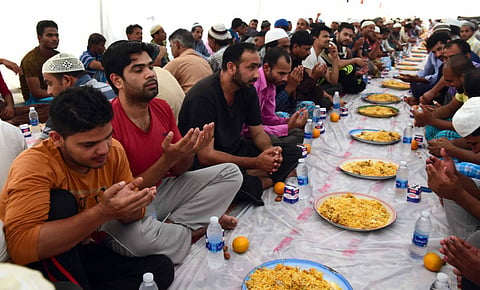Iftar tents help labourers save on food
World Memon Organisation Middle East has set up three tents in Dubai and Ajman this Ramadan

Dubai: Iftar tents around the UAE help thousands of labourers save on food during Ramadan every year, with many philanthropists and corporations stepping up their charitable activities during the fasting month.
Among scores of organisations that make the month sweeter for the poorer segment of society is the World Memon Organisation Middle East (WMO), which serves free iftar meals to more than 3,000 labourers in three massive tents in Dubai and Ajman.
This is the third straight year that the WMO is organising the iftar programme while steadily increasing its capacity.
“Two years ago, we started with one tent serving 1,000 people daily. Now, our target is to serve around 100,000 throughout the month. This year being the Year of Giving, we decided to expand our operations and set up three tents so that more people can benefit,” said Mahmoud Shaikhani, deputy secretary-General of WMO.
WMO Middle East is an umbrella organisation of the Memon community, which originates in the subcontinent, mainly in Pakistan, and is known for their business acumen and philanthropy.
Located at Dubai Investment Park, Muhaisnah, and Ajman, each tent accommodates more than 1,000 people.
“Our tents are open for people from all communities and faiths, the idea is to welcome everyone without any discrimination and promote love and harmony,” said Haroon Karim, chairman — Board of Trustees, WMO.
Organised in partnership with PepsiCo Middle East, the month-long iftar programme costs around Dh1 million, which is mostly covered by the contributions from community members.
“We have more than 5,000 Memon families based in the UAE, but only a few hundred actively participate and contribute to community services. Apart from financial contributions, many people also volunteer to serve iftar in the tents while others take care of the logistics. So it’s a real team effort that goes into arranging more than 3,000 meals daily at different locations,” said Shaikhani, speaking to Gulf News at the WMO’s Muhaisnah tent on Monday.
On Monday, beneficiaries at the Muhaisnah tent began to gather around an hour before iftar, helping arrange the spread of chicken biryani, laban, dates, fruits and water.
“We usually come around an hour before. It is a good opportunity for us to socialise by helping arrange the meals. We are grateful to have this free meal and we feel better if we contribute in any way we can,” said Ashraful Islam, a Bangladeshi carpenter, who was among the volunteers at the tent.
Another labourer, Mohammad Bilal, who enjoyed iftar in the tent, said: “Among the blessings of Ramadan for us is that we get to save on food. After having this delicious meal, there is usually not much appetite left for anything else at night. We usually carry the fruits available at the tent and eat them during suhour. So we have both ends covered.”
Karim, Shaikhani and other members of the WMO board regularly monitor operations at the Ajman-based kitchen as well as in all three tents for quality, hygiene and efficiency.
WMO is a registered humanitarian organisation with Dubai’s International Humanitarian City.

